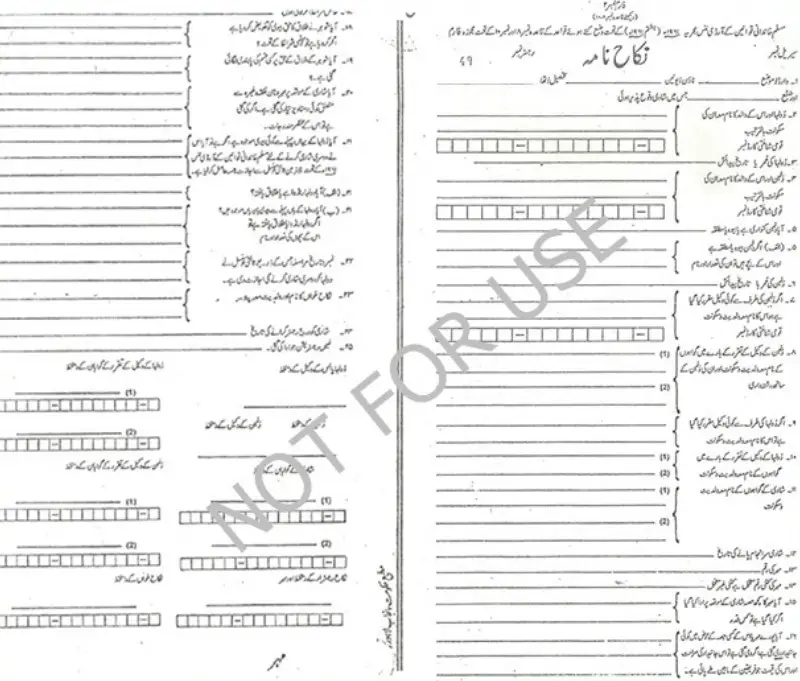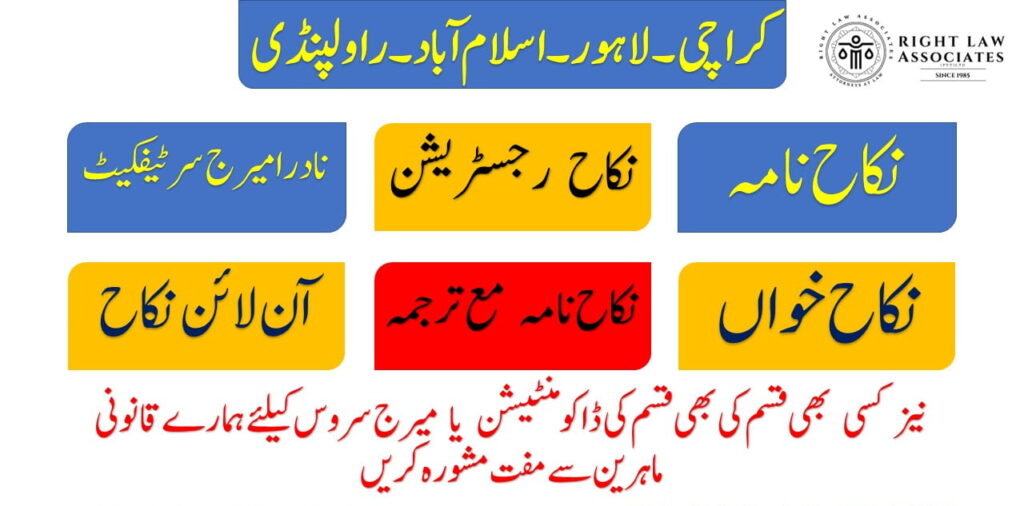- Karachi
- Lahore
- Islamabad
- Leads, UK
- Reading, UK
- Quebec, Canada


Nikah Nama: Nikah Nama Form|Pakistani Nikah Nama|Nikah Online|Nikah Nama Urdu/English. Nikah Nama form holds Nikah’s detail. Nikah Nama is a marriage document/certificate/contract. Pakistani Nikah Nama has 25 columns. Nikah Nama can be used in Urdu or English. The Nikah Nama serves as a document to record the details of a Nikah. It records the Nikah’s condition and detail of contracting parties and witnesses. It records the personal details of the parties to the marriage, such as; amount of dower, conditions of the Nikah settled between the parties and the names and addresses of the witnesses to the marriage.
The Nikah Nama is a marriage contract which serves as proof of marriage and as a public document, it is admissible as evidence in court if there is a dispute regarding the marriage.
Based on the language of its columns, distinguished by numerical numbers, the Nikah Nama records the facts and conditions that have been agreed upon between the parties. In the Nikah Nama, information should be recorded carefully and in the manner in which it is being requested. To avoid ambiguity in case of disputes, the facts recorded should be clear and understandable. The penalty for violating this is a fine of twenty-five thousand rupees and up to one-month imprisonment.
A Nikah Nama form is a document that records the details of a Nikah (marriage). On the Nikah Nama Form, the Nikah Registrar records the names and addresses of the witnesses to the marriage, the amount of dower, and the conditions of the Nikah (Muslim marriage).
Nikah Nama form is also called Pakistani Nikah Nama. For our Nikah online service, we use Nikah Nama in English because our clients living in foreign countries require English Nikah Nama rather than Urdu Nikah Nama Form. Nikah Nama form keeps all detail of Nikah’s contract. Nikah Nama form, after signatures of all concerned persons and signature and seal of the Nikah Registrar, turns to a marriage document/ certificate/contract.
During the Islamic marriage ceremony, both partners sign on the Nikah Nama form, which is a Pakistani Islamic contract. It is fundamental to the Pakistani Muslim marriage ceremony and helps to determine the rights and responsibilities of both partners in the marriage (bride and groom).
The Nikah Nama form is being used for several decades, in Pakistan, India, Iran and Afghanistan, to record all major and minor detail of a marriage contract between a bride and the bridegroom. Nikah Nama form, or the marriage contract, contains all details of the marital union, including the names and parentage of the parties, their ages, National ID Card numbers, addresses, detail of attorneys and witnesses, and the amount of Mehar or Mahr, and other personal information.

Nikah Nama must include the conditions of the Nikah at the time of the Nikah or before it. The parties can, however, revise any conditions with mutual consent, and it is better to record them in writing in the form of an acknowledgement or agreement according to their nature and register it separately with the Registrar under the Registration Act, 1908.
The practice of ‘Watta Satta or exchange marriages is common in many parts of Pakistan, where both parties agree that they will give a woman in exchange for marriage with another woman. (Like a barter system)
Nikah Namas can include this condition, or parties may draw up a separate contract on stamp paper and refer to that in the Nikah Nama.
Does the husband have the right to delegate talaq to his wife? If yes, under what conditions? A couple can unilaterally terminate their Nikah by pronouncing talaq according to Muslim family law, and this is a right that can also be delegated to their wife. Consequently, both the husband’s and the wife’s rights remain intact. A woman can use this right to pronounce talaq upon herself on behalf of her husband and must follow the same procedure as a man would have to if he used it.
In column 19, it is asked whether any restrictions have been imposed on the husband’s right to talaq. This right can be conditional, but it does not mean that the husband has lost the right to pronounce talaq in its entirety. Additionally, it must be made clear that the law does not require the husband to give a reason for the divorce. Talaq is affected if the stated procedure is followed.
Ultimately, it is up to the woman to relinquish the dower. Dower can be relinquished or gifted according to law, but it is the burden of proof on the person who has to pay it. To ensure that the wife has acted as a free agent in relinquishing her dower in the event of a dispute, the Court must ensure that she was not coerced, etc. A person who relinquishes dower through an affidavit must substantiate that affidavit.
Brides receive bridal gifts from their mother-in-law and her parents when they get married. Jewelry given to the bride by the groom will belong to the girl, while jewelry given by the groom belongs to him. The wife may file suit for compensation if the husband fails to honor a promise or undertaking to give her a gift (cash or property) recorded in the Nikah Nama (usually in column 17).
As per Pakistani law, a man requires the consent of his first wife to enter into a second marriage. He will, however, be required to obtain the arbitration council’s permission certificate. To seek permission for polygamous marriage, one must go to the Union Council of the residence of the applicant’s existing wife at the time of the application, even if the home is in a different city.
Child Marriage Restraint Act (CMRA) 1929 is the applicable law in this case. In 2015, the Act was amended however, this law was not fundamentally altered by the amendments; but only strengthened punishment for certain violations. CMRA defines child marriage as one where either one or both of the parties are under the legal age of marriage (18 for females and males). Child marriage is punishable but it does not invalidate a marriage. Marriages of this kind continue until they are either repudiated or ratified by the parties involved.
“As per THE CHILD MARRIAGE RESTRAINT ACT 1929, “child” means a person who, if a male, is under eighteen years of age, and if a female, is under sixteen years of age.” (Quotation)
A valid Muslim marriage requires free consent, and a marriage obtained by force or misrepresentation or without free consent is invalid. The Pakistan Penal Code (PPC) or any other law that applies to any form of forced marriage may be applied.
Online Nikah service with Nikah Nama (Nikah Form) in English and Urdu is being offered by us through our Nikah Khawan from our offices in Karachi, Islamabad, Lahore and Rawalpindi. Our Nikah Khawans (Qazis) can be booked for offline or online Nikah ceremonies/functions at your home, marriage halls, banquets, or hotels/clubs in Karachi, Lahore, Islamabad, and Rawalpindi with Urdu or English Nikah Nama and for the prompt registration of Nikah with Urdu or English Nikah Nama. The translation of Nikah Nama into English, Arabic, Persian and other languages can be provided.
Pakistanis residing abroad can avail of the facility of online nikah/ online marriage services. Nikah solemnizing may take only 20 minutes to complete the online Nikah or online marriage process in Pakistan. If you live in faraway cities or countries, such as the UAE, Saudi Arabia, the UK, the USA, Canada, Australia, etc., this is the best option for you.
Since 2012, we have offered an online ordering system for Nikah services in Karachi, since 2018 in Islamabad, Rawalpindi, and from the last two years, also in Lahore. Our Nikah Khawans and Nikah Registrars are always available to perform your Nikah ceremonies at your home, in your marriage hall, or during your banquet. Nikah nama is available in both English and Urdu languages.
You can also visit our offices in Karachi, Lahore and Islamabad to book our Nikah Khawan (Qazi). For booking our Nikah Khawan (Qazi), please call us.
Are you looking for a trustworthy and expert law firm to get legal help? Right Law Associates can help you with that. Right Law Associates is a team of professional lawyers in Karachi, Islamabad, and Rawalpindi serving for more than 30 years in the fields of Family Law, Civil Law, Criminal Law, Business Law, etc. Please give us a call on 0331-6644789 for Civil Marriage, Court Marriage, Online Marriage, or Nikah Online, Nikah Khawan Service (Qazi Service for Nikah). We also deal in various family matters such as Divorce, Khula, Dissolution of Marriage, Child Custody, Child Maintenance, etc. We look forward to assisting you!
For decades, the Nikah Nama form has been used to record all major details of a marriage contract between a bride and the bridegroom. The form, or the marriage contract, contains all details of the marital union, including the parties’ names and parentage, ages, National ID Card numbers, addresses, details of attorneys and witnesses, the amount of Mehar or Mahr, and other personal information.
Under Section 5 of the Muslim Family Law Ordinance, all marriages performed under Muslim Law must be registered. To register, each Union Council appoints a Nikah Registrar in its area, who is granted a license by the Union Council.
Both, the Nikah Nama (detailed marriage document) and the Marriage Certificate (concise marriage document) are the official records of marriages in Pakistan.
The Nikah Nama is a traditional Urdu (English also) marriage contract to record and certify the marriage between a male and a female. Nikah Nama is issued by the Union Councils through the Nikah Registrars. A few years back, NADRA developed a computerized system of civil registration which is being used by the Union Councils for civil registrations of births, deaths, marriages and divorces. A (NADRA) Marriage Registration Certificate (as people call it), is a computerized marriage certificate in both, Urdu and English languages.
The registry book of Nikah Nama is used to keep all marriage records recorded by Nikah khawans. The Nikah Registrar provides the newlywed couple with two copies of the Nikah Nama, one for the bride and one for the groom. A valid Nikah Nama must be stamped by the official seal of the Nikah Registrar.
Nikah Nama can be obtained using the Marriage Services of Right Law Associates in Karachi, Islamabad, and Rawalpindi. All you need is to contact us to consult your requirements with our expert family lawyers.
The marriage/Nikah must be performed in the presence of two witnesses. In case you do not have any witnesses, don’t worry, we can arrange witnesses for you.
Yes, either the bride’s or the groom’s parents can be witnesses. This might seem to be a ‘conflict of interest,’ since the role of the witness is to ensure the legality and propriety of the ceremony.
NADRA Marriage Registration Certificates are computerized certificates of marriage. These official NADRA Marriage Registration Certificates are now being used in many legal matters in Pakistan and other countries of the world in addition to the Nikkah Nama.
Marriage Certificates serve as an official record of the marriage of two people, and they are essential for proving a change of name following marriage, for divorce, for adoption, for pensions, and for passports.
If you wish to obtain a NADRA marriage registration certificate in Pakistan, you will need the following documents:
As far as the issuance of Marriage Certificates is concerned, there is no specific timeline in Pakistan. The completion of this process may take between 2-7 working days, depending on the case.
By hiring a Lawyer, you can perform an online marriage in Pakistan by using the Pakistani Marriage Laws and Sharia (Hanafi School of Thought). Both spouses do not have to be Pakistani citizens to get married online in Pakistan.
A vakil (attorney), or wakil, acts as an attorney, representative, delegate, proxy or agent for Nikah on behalf of the bride or groom.

Some Useful Services:
Court Marriage Process
Court Marriage Fee
Court Marriage & Civil Marriage
Online Marriage & Online Nikah
Nikah Online with Pakistani Nikah Nama in English
Divorce Lawyers
About Divorce & Khula
Online Nikah Services
Nikah Online in Pakistan
Qualified Nikah Khawan Services
Court Marriage Services in Pakistan
Court Marriage Procedure in Pakistan
